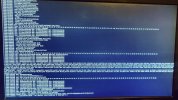The kernel panic from that log was just looking plain random, so I'm not sure if that has to be the case or if one can even just determine that from such random looking events.Not sure it's only AMD related....
I've got the same sort of kernel panic on a Dell R710 with Intel xeon.
Can you post yours here, without being able to reproduce it ourselves we need as much of relevant (!) logs and basic system info (exact CPU, what guests OS run, maybe even a VM config), so that we can actually narrow it down enough to find the actual issue at play. There could be more than one here, as said one kernel panic is not necessarily connected to the others, and from experience such threads tend to attract all which observed anything looking like a kernel oops, even if something completely different.


